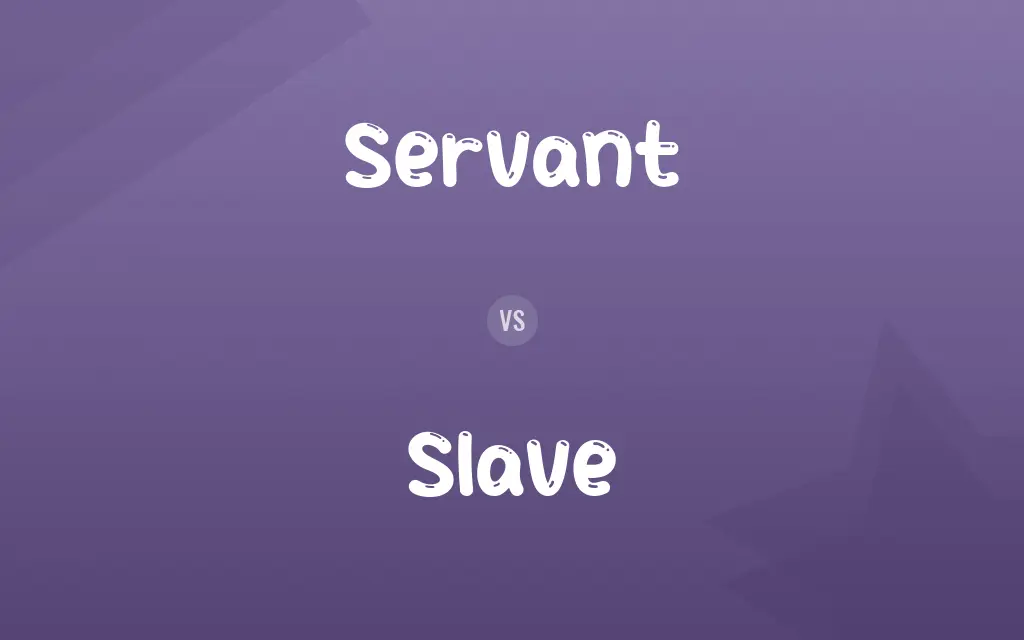Servant vs. Slave: Difference and Comparison
By Muazma Batool & Muneeza Rehman — Published on March 29, 2024
A servant is an individual employed to perform domestic duties, often compensated and with personal freedoms; a slave is forced to work without consent, compensation, or rights.

Difference Between Servant and Slave
Servants are employed through an agreement or contract and receive wages for their labor. They retain their personal freedoms, including the right to leave their employment. In contrast, slaves are individuals held against their will, forced into labor without the right to refuse work or leave, and considered property of their owners.
Muazma Batool
Mar 29, 2024
Historically, the term "servant" implies a level of voluntary engagement and economic transaction, including room, board, and sometimes education, in exchange for work. Slavery, however, is marked by coercion, where individuals are bought, sold, and deprived of their basic human rights. This distinction is crucial in understanding the legal and moral implications of each term.
Muazma Batool
Mar 29, 2024
The conditions of servants can vary widely based on their employers and the terms of their employment, but they generally have protections under the law and the ability to change their situations. Slaves, on the other hand, suffer from complete disenfranchisement, often enduring harsh conditions without any legal recourse or protection.
Muazma Batool
Mar 29, 2024
In modern contexts, the concept of servitude has evolved to include formal employment in domestic and other sectors, where workers have rights and regulations safeguarding their welfare. Conversely, slavery, though officially abolished in most countries, still exists in illegal forms, including human trafficking and forced labor, highlighting ongoing human rights issues.
Muazma Batool
Mar 29, 2024
The societal roles of servants and slaves also differ significantly. Servants may hold positions of trust and responsibility, sometimes becoming integral parts of the families they serve. Slaves, however, are denied any status beyond property, with no autonomy or opportunity to advance personally or socially.
Kaitlyn
Mar 29, 2024
Servant vs. Slave Comparison Chart
Compensation
Receives wages, room, and board
No compensation; considered property
Muazma Batool
Mar 29, 2024
Conditions
Vary; generally better than slavery, with some protections
Often harsh and inhumane
Levi
Mar 29, 2024
Social Status
Can be integral to a household or employer
Denied status, autonomy, and opportunities
Levi
Mar 29, 2024
Servant vs. Slave Definitions
◉Servant
Works under a contract or agreement with specific terms.
As a servant, she had a clear agreement outlining her duties and compensation.
Muazma Batool
Feb 27, 2024
◉Slave
Considered property of the owner, bought and sold.
Slaves were auctioned to the highest bidder, separated from families.
Nolan
Feb 27, 2024
◉Servant
Can leave or change employment voluntarily.
After years of service, the servant left to pursue a different career path.
Leo
Feb 27, 2024
◉Slave
Suffers inhumane treatment and living conditions.
Slaves lived in cramped quarters, facing harsh conditions daily.
Levi
Feb 27, 2024
◉Servant
An individual employed to perform domestic duties, often living with the employer.
The family's servant helped with cooking and cleaning, receiving wages and days off.
Kaitlyn
Feb 27, 2024
◉Slave
Legally emancipated in many countries, but illegal forms persist.
Despite abolition, modern slavery continues through human trafficking.
Muazma Batool
Feb 27, 2024
◉Servant
Rights and freedoms protected by employment laws.
The servant was protected by labor laws, ensuring fair treatment and work conditions.
Muazma Batool
Feb 27, 2024
◉Slave
An individual forced into labor without consent, compensation, or rights.
The slave worked the plantation fields from dawn until dusk, without pay.
Muazma Batool
Feb 27, 2024
◉Servant
May have specialized skills or roles within employment.
The household's head servant managed other staff and coordinated events.
Elijah
Feb 27, 2024
◉Slave
Denied personal freedoms and subjected to owner's control.
The slave had no freedom to travel or make decisions independently.
William
Feb 27, 2024
◉Slave
One who is owned as the property of someone else, especially in involuntary servitude.
Muazma Batool
Feb 27, 2024
◉Servant
One who is publicly employed to perform services, as for a government.
Muazma Batool
Feb 27, 2024
◉Servant
One who expresses submission, recognizance, or debt to another
Your obedient servant.
Muazma Batool
Feb 27, 2024
◉Slave
One who is subject to or controlled by a specified influence
A slave to alcohol.
A slave to an irrational fear.
Muazma Batool
Feb 27, 2024
Servant vs. Slave Frequently Asked Questions
What distinguishes a servant from a slave?
A servant engages in work voluntarily under an employment agreement, often with compensation and rights, whereas a slave is forced into labor without consent or compensation, lacking basic human rights.
Muazma Batool
Mar 29, 2024
Can servants choose to leave their employment?
Yes, servants can leave their employment based on the terms of their contract or agreement, often with notice to their employer.
Muazma Batool
Mar 29, 2024
Does slavery still exist today?
Yes, despite being legally abolished in most countries, slavery exists in various forms, including forced labor and human trafficking, violating human rights globally.
Muazma Batool
Mar 29, 2024
How did servants historically differ from slaves?
Historically, servants worked under contracts and were compensated, while slaves were forced into labor and owned as property, without rights or compensation.
Elijah
Mar 29, 2024
Can a servant become a slave?
Under legal definitions, a servant cannot become a slave as servitude is based on voluntary employment, whereas slavery involves coercion and lack of freedom.
Elijah
Mar 29, 2024
Are all domestic workers considered servants?
Most domestic workers are considered servants in the sense that they are employed voluntarily and have specific rights and protections under labor laws.
Olivia
Mar 29, 2024
How were slaves treated historically?
Historically, slaves were subjected to extremely harsh treatment, including physical punishment, inadequate living conditions, and denial of any personal freedoms.
Levi
Mar 29, 2024
What legal protections do servants have?
Servants are protected under labor laws that ensure fair treatment, compensation, and safe working conditions.
Leo
Mar 29, 2024
Are slaves paid for their work?
No, slaves are not compensated for their labor; they are forced to work under threat of punishment and considered property of their owners.
Muazma Batool
Mar 29, 2024
What rights do modern servants have?
Modern servants, or domestic workers, have rights outlined by labor laws in their respective countries, including minimum wage, working hours, rest periods, and protection from abuse.
Nolan
Mar 29, 2024
Content Creators
Written by
Muazma BatoolAs a content editor, Muazma Batool is not just a grammar guru but a creative mastermind who breathes life into every word. With an eagle eye for detail and a passion for storytelling, she transforms bland text into engaging content that captivates audiences and drives results.
Co-written by
Muneeza RehmanAt Comparisons.wiki, Muneeza skillfully navigates the vast sea of information, ensuring clarity and accuracy as the lead content editor. With a keen eye for detail, she curates every comparison to enlighten and engage readers.
































